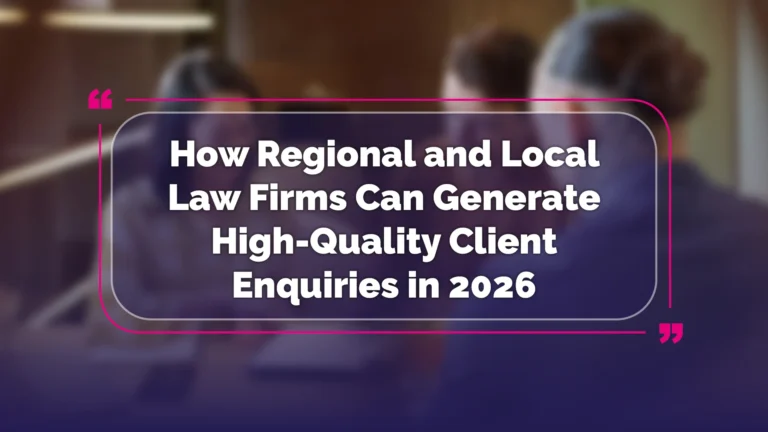Key Takeaways – PPC for Law Firms
- PPC Targets Your Ideal Clients: PPC allows law firms to reach specific audiences, using keywords and ad targeting to attract those actively searching for legal services.
- Optimised Landing Pages Matter: Effective PPC campaigns require landing pages designed to convert leads with clear calls-to-action and relevant information.
- Measure & Adjust Campaigns: Regularly tracking metrics like CTR, CPC, and conversion rate helps law firms refine their PPC strategies for better ROI.
- Choose the Right PPC Partner: Finding an experienced PPC partner can maximise budget efficiency, ensuring campaigns align with firm goals.
Getting in front of potential clients requires more than just a website or traditional advertising. Pay-per-click (PPC) advertising is an essential tool for law firms to reach prospective clients searching online for legal assistance. With PPC services, firms can secure prime placement in search results and across social platforms, driving targeted traffic and generating leads. This guide explores the fundamentals of PPC for law firms, from keyword research to platform selection, and offers strategies to maximise returns on investment and reach marketing goals effectively.
1. What Is PPC for Law Firms?
Pay-per-click (PPC) advertising is an online marketing model where law firms pay a fee each time their ad is clicked. PPC helps law firms reach potential clients searching for legal services by placing their ads prominently on search engine results pages (SERPs) or social media platforms. For example, Google Ads allows firms to appear at the top of search results for keywords like “personal injury lawyer” or “divorce lawyer.” A well-managed Google ad campaign can significantly enhance visibility and attract more clients by targeting the right keywords.
2. The Unique Value of PPC for Law Firms
Law firms operate in a competitive market, and PPC advertising offers an effective way to quickly increase visibility, attract relevant clients, and outperform competitors. Unlike traditional advertising methods, law firm’s PPC campaigns provide immediate results and precise audience targeting, making it ideal for lawyers looking to generate high-quality leads.
3. Understanding PPC
PPC advertising functions on a bidding system, where law firms bid on keywords related to their services. When a user searches for those keywords, ads from the highest bidders appear. Advertisers only pay when a user clicks on their ad, which means you’re only paying for genuine interest, rather than impressions. Additionally, PPC enables granular control over budget, target audience, and scheduling, making it highly flexible and measurable. Effective management of PPC ad spend is crucial to prevent overspending and optimise campaign performance.
4. Types of PPC Ads and Platforms
Each PPC platform provides unique ways to target audiences, allowing law firms to experiment with various ad types and formats.
a. Google Ads
Google Ads is one of the most widely used PPC platforms, offering law firms the ability to appear on the Google search engine and across its extensive Display Network. A well-structured Google Ads campaign allows firms to target users searching for specific legal services, such as “estate planning lawyer” or “family law solicitor.”
b. Bing Ads
Although Bing has a smaller market share than Google, its audience can often include older, high-income users. Bing Ads works similarly to Google Ads and can be a cost-effective choice for law firms targeting specific demographics.
c. LinkedIn Ads
LinkedIn is particularly valuable for law firms focused on corporate law, employment law, or services targeted toward business professionals. LinkedIn’s targeting options allow firms to reach audiences based on job title, industry, and company size.
d. Facebook Ads
Facebook’s extensive user base and advanced targeting options make it a valuable platform for law firms seeking to reach users based on interests, demographics, and online behaviour. Retargeting ads are especially effective on Facebook, allowing firms to re-engage visitors who have previously interacted with their website.
5. Define Your Goals and Target Audience
Defining your goals and target audience is a crucial step in creating a successful PPC campaign for your law firm. Your goals should be specific, measurable, achievable, relevant, and time-bound (SMART). For example, your goal might be to increase the number of leads generated from your PPC campaign by 20% within the next 6 months.
To define your target audience, you need to understand who your ideal client is, what their pain points are, and what motivates them to search for legal services online. You can use tools like Google Analytics and Google Trends to gather data about your website visitors and their search behaviour.
Some key factors to consider when defining your target audience include:
- Demographics: age, location, income level, education level, etc.
- Interests: hobbies, interests, and behaviours that are relevant to your legal services
- Behaviours: online behaviours, such as search queries, browsing history, and device usage
- Pain points: specific challenges or problems that your target audience is trying to solve
- Motivations: what drives your target audience to search for legal services online
By understanding your target audience, you can create PPC ads that are highly relevant and targeted to their needs, increasing the likelihood of conversion.
5. Keyword Research for PPC Success
Effective PPC campaigns for law firms start with comprehensive keyword research to identify relevant keywords. Choosing the right keywords can make or break your campaign by either attracting qualified leads or wasting your budget.
a. Selecting High-Intent Keywords
Identify keywords with high commercial intent, which signal a readiness to convert. Keywords like “hire personal injury solicitor” or “divorce lawyer near me” often indicate a user is ready to engage. Tools like Google Keyword Planner and SEMrush are helpful in identifying these high-intent terms.
b. Negative Keywords
Negative keywords prevent ads from showing for irrelevant searches. For instance, a criminal defense lawyer might add “free consultation” as a negative keyword if they don’t offer this service, ensuring their budget isn’t spent on irrelevant clicks.
6. Landing Pages Designed to Convert
A well-designed landing page is essential for converting traffic from PPC ad campaigns into leads. Law firms should focus on creating landing pages tailored to specific ad campaigns, ensuring the messaging aligns with the ad’s intent. Key elements for high-conversion landing pages include:
- Clear Call to Action (CTA): Encourage immediate action with CTAs like “Get a Free Consultation” or “Call Now for Legal Advice.”
- Trust Indicators: Include testimonials, certifications, and affiliations to build credibility.
- Concise Information: Present information clearly, focusing on benefits and how the firm can meet client needs.
- Optimised for Mobile: Ensure the landing page is responsive, as many users search for legal help on mobile devices.
7. Crafting Compelling Ad Copy
Effective PPC ads rely on compelling, relevant ad copy that captures the user’s attention and prompts them to click. Law firms should focus on:
- Highlighting Unique Selling Points (USPs): Emphasise what sets the firm apart, such as years of experience, client satisfaction, or niche expertise.
- Addressing Pain Points: Use ad copy that acknowledges common client concerns, like “Get the Compensation You Deserve” or “Protect Your Rights.”
- Ad Extensions: Use ad extensions to provide extra information, such as links to specific services, contact information, or additional descriptions.
9. Target the Right Location and Devices
Targeting the right location and devices is critical to the success of your PPC campaign. You want to ensure that your ads are being shown to people who are located in your service area and are using devices that are relevant to your target audience.
Google Ads allows you to target specific locations, including countries, regions, cities, and even post codes. You can also target specific devices, such as desktops, laptops, mobile phones, and tablets.
When targeting locations, consider the following:
- Service area: target the areas where your law firm provides services
- Competitor locations: target areas where your competitors are located
- Demographic locations: target areas with demographics that match your target audience
When targeting devices, consider the following:
- Mobile devices: target mobile devices if your target audience is likely to be searching for legal services on their mobile phones
- Desktop devices: target desktop devices if your target audience is likely to be searching for legal services on their computers
- Tablet devices: target tablet devices if your target audience is likely to be searching for legal services on their tablets
By targeting the right location and devices, you can increase the relevance of your PPC ads and improve the likelihood of conversion.
8. Measuring PPC Success
Tracking and analysing PPC performance helps law firms understand what’s working and where improvements are needed. Key metrics to monitor include:
- Click-Through Rate (CTR): Indicates how well the ad copy is resonating with the target audience.
- Conversion Rate: Measures how many clicks resulted in leads or enquiries.
- Cost per Conversion (CPC): Determines the average cost for each lead, helping assess campaign ROI.
- Quality Score: A Google metric that combines CTR, ad relevance, and landing page experience; a high Quality Score lowers the cost per click.
9. The Benefits of Retargeting
Retargeting allows law firms to re-engage visitors who left their website without converting. By displaying ads to users who have previously shown interest, retargeting keeps the firm top-of-mind and can significantly increase conversion rates. Google Ads and Facebook offer robust retargeting options that help turn previous visitors into clients.
10. Budgeting and Bidding Strategies
Setting a realistic budget and choosing the right bidding strategy can maximise ad spend. Bidding options include:
- Manual CPC Bidding: Allows full control over the cost per click.
- Target CPA (Cost per Acquisition): Google’s automated bidding aimed at achieving a set CPA.
- Maximise Conversions: Optimises bids to drive as many conversions as possible within the budget.
Law firms may need to test different strategies to find what delivers the best results.
11. The Role of A/B Testing
A/B testing involves creating multiple ad variations to see which version performs better. Law firms can test different ad copy, images, CTAs, or landing page layouts to optimize their campaigns continuously. Regular A/B testing helps refine targeting, improve click-through and conversion rates, and maximise ROI.
12. Compliance and Ethical Considerations
Law firms must follow ethical guidelines when running PPC campaigns, especially around claims of expertise and client confidentiality. Avoid misleading language or exaggerated claims, as this can lead to disciplinary action and harm the firm’s reputation. Partnering with a PPC agency familiar with legal advertising standards can ensure compliance and reduce risks.
13. Finding the Right PPC Partner
Choosing a qualified PPC partner can make all the difference in achieving campaign goals. Consider the following criteria when evaluating potential PPC agencies:
- Experience in Legal Marketing: Ensure the agency understands the specific needs and regulations of legal advertising.
- Proven Track Record: Look for case studies or testimonials from other law firms.
- Transparent Pricing: Avoid hidden fees or inflexible contracts.
- Customised Strategies: A good PPC partner should offer tailored strategies, not one-size-fits-all solutions.
If you’re looking to get started with PPC for law firms, contact our marketing team today to see how we can help you achieve your digital advertising goals.
Conclusion
For law firms, PPC advertising offers a powerful way to drive traffic, generate leads, and grow their practice. From selecting high-intent keywords to crafting compelling ad copy, each component of a PPC campaign requires careful consideration. By measuring success, conducting regular A/B testing, and choosing a reliable PPC partner, law firms can build effective, ethical PPC campaigns that attract clients and support long-term growth.




